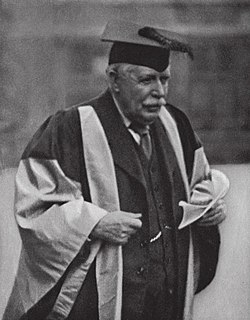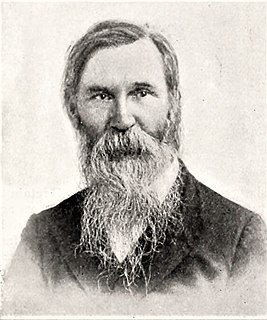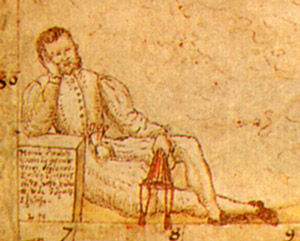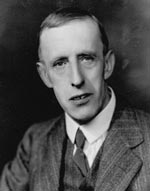 W
WCaroline Agnes Brady was an American philologist that specialised in Old English and Old Norse works. Her works included the 1943 book The Legends of Ermanaric, based on her doctoral dissertation, and three influential papers on the Anglo-Saxon poem Beowulf. She taught at the University of California, Berkeley, the University of Pennsylvania, Johns Hopkins University, and Harvard University, among other places.
 W
WJames Wilson Bright (1852–1926) was an American philologist active in the late nineteenth and early twentieth century. He was a Professor of English Philology at Johns Hopkins University, and specialized in early Germanic languages and Old and Middle English specifically.
 W
WThe Rev. William Slater Calverley (1847–1898) was an unassuming rural English vicar who through diligent study and painstaking scrutiny became an extraordinary amateur antiquarian. Although born in Leicestershire, Calverley claimed his fame through interpreting the carved sculptured relics that he and others found in Cumberland churchyards. He made intricate drawings, corresponded with academic authorities, and gave his own interpretations, which he then relayed to a wider audience. Calverley later produced in intricate detail a life-sized reproduction of the famous Gosforth Cross, which now stands in Aspatria churchyard.
 W
WHector Munro Chadwick was an English philologist. Chadwick was the Elrington and Bosworth Professor of Anglo-Saxon and the founder and head of what is today known as the Department of Anglo-Saxon, Norse and Celtic at the University of Cambridge. He was well known for his encouragement of interdisciplinary research on Celts and Germanic peoples, and for his theories on the Heroic Age in the history of human societies. Chadwick was a tutor of many notable students and the author of numerous influential works in his fields of study.
 W
WRaymond Wilson Chambers was a British literary scholar, author, and academic; throughout his career he was associated with University College London (UCL).
 W
WThomas Mowbray Charles-Edwards is an emeritus academic at Oxford University. He formerly held the post of Jesus Professor of Celtic and is a Professorial Fellow at Jesus College.
 W
WAlbert Stanburrough Cook was an American philologist, literary critic, and scholar of Old English. He has been called "the single most powerful American Anglo-Saxonist of the nineteenth and twentieth centuries."
 W
WJulia Catherine Crick, is a British historian, medievalist, and academic. She is Professor of Palaeography and Manuscript Studies at King's College London.
 W
WKevin John William Crossley-Holland is an English translator, children's author and poet. His best known work is probably the Arthur trilogy (2000–2003), for which he won the Guardian Prize and other recognition.
 W
WHilda Roderick Ellis Davidson was an English folklorist. Davidson was a Fellow at Lucy Cavendish College, Cambridge and a leading member of the The Folklore Society. She specialized in the study Celtic and Germanic religion and folklore, on which she was the author of numerous influential works.
 W
WRené Lodewijk Maurits Derolez was a Belgian philologist who was Professor of English and Germanic Philology at Ghent University. He specialized in runology and the study of Old English literature and Germanic religion.
 W
WElizabeth Elstob, the "Saxon Nymph", was a pioneering scholar of Anglo-Saxon.
 W
WMargaret Joy Gelling, was an English toponymist, known for her extensive studies of English place-names. She served as President of the English Place-Name Society from 1986 to 1998, and Vice-President of the International Council of Onomastic Sciences from 1993 to 1999, as well as being a Fellow of St Hilda's College, Oxford, and member of both the Society of Antiquaries of London and the British Academy.
 W
WRev. John Allen Giles (1808–1884) was an English historian. He was primarily known as a scholar of Anglo-Saxon language and history. He revised Stevens' translation of the Anglo-Saxon Chronicle and Bede's Ecclesiastical History of the English People. He was a fellow at Corpus Christi College, Oxford.
 W
WRitchie Girvan was a Scottish literary scholar, author, and academic; throughout his career he was associated with the University of Glasgow, where he made his name studying the Old English poem Beowulf. He is best known for his 1935 book Beowulf and the Seventh Century: Language and Content.
 W
WCharles Wycliffe Goodwin (1817–1878) was an English Egyptologist, bible scholar, lawyer and judge. His last judicial position was as Acting Chief Judge of the British Supreme Court for China and Japan.
 W
WDennis Howard Green was an English philologist who was Schröder Professor of German at the University of Cambridge. He specialized in Germanic philology, particularly the study of Medieval German literature, Germanic languages and early Germanic culture. Green was considered one of the world's leading authorities in these subjects, on which he was the author of numerous influential works.
 W
WRobert Howard "Robin" Hodgkin was an English historian of modern history at Queen's College at the University of Oxford, who served as its provost from 1937 until 1946. In 1900, he was named a Lecturer of modern history at the college, and from 1928 to 1934 was a University Lecturer in that subject. His seminal work, A History of the Anglo-Saxons, was published in 1935, and in his retirement he published Six Centuries of an Oxford College: A History of the Queen's College, 1340–1940.
 W
WWilliam Witherle Lawrence was an American philologist who served as Professor of English at Columbia University from 1905 to 1936.
 W
WWinfred Philip Lehmann was an American linguist who specialized in historical, Germanic and Indo-European linguistics. He was for many years a professor and head of departments for linguistics at the University of Texas at Austin, and served as president of both the Linguistic Society of America and the Modern Language Association. Lehmann was also a pioneer in machine translation. He lectured a large number of future scholars at Austin, and was the author of several influential works on linguistics.
 W
WFelix Liebermann was a Jewish German historian, who is celebrated for his scholarly contributions to the study of medieval English history, particularly that of Anglo-Saxon and Anglo-Norman law.
 W
WEdward Lye (1694–1767) was an 18th-century scholar of Old English and Germanic philology.
 W
WFrederic William Maitland was an English historian and lawyer who is regarded as the modern father of English legal history.
 W
WKemp Malone was a prolific medievalist, etymologist, philologist, and specialist in Chaucer who was lecturer and then professor of English Literature at Johns Hopkins University from 1924 to 1956.
 W
WFrancis Andrew March, was an American polymath, academic, philologist, and lexicographer. He is considered the principal founder of modern comparative linguistics in Anglo-Saxon.
 W
WSir Roger Aubrey Baskerville Mynors, often cited as R. A. B. Mynors, was an English classicist, textual critic, and medievalist who held the senior chair of Latin at the universities of Oxford and Cambridge. He is most renowned for his contribution to the study of manuscripts, from which most classical texts are reconstructed.
 W
WLaurence Nowell was an English antiquarian, cartographer and pioneering scholar of Anglo-Saxon language and literature.
 W
WSir Francis Palgrave, was an English archivist and historian. He was Deputy Keeper of the Public Record Office from its foundation in 1838 until his death; and he is also remembered for his many scholarly publications.
 W
WSir Frederick Pollock, 3rd Baronet PC, FBA was an English jurist best known for his History of English Law before the Time of Edward I, written with F.W. Maitland, and his lifelong correspondence with US Supreme Court Justice Oliver Wendell Holmes. He was a Cambridge Apostle.
 W
WCharles Randolph Quirk, Baron Quirk, CBE, FBA was a British linguist and life peer. He was the Quain Professor of English language and literature at University College London from 1968 to 1981. He sat as a crossbencher in the House of Lords.
 W
WThomas Alan Shippey is a British scholar and retired professor of Middle and Old English literature, as well as medievalism and modern fantasy and science fiction. In particular he is widely considered one of the world's leading academic scholars on the works of J. R. R. Tolkien about whom he has written several books and many scholarly papers.
 W
WEduard Sievers was a philologist of the classical and Germanic languages. Sievers was one of the Junggrammatiker of the so-called "Leipzig School". He was one of the most influential historical linguists of the late nineteenth century. He is known for his recovery of the poetic traditions of Germanic languages such as Anglo-Saxon and Old Saxon, as well as for his discovery of Sievers' law.
 W
WWalter William Skeat, FBA was the pre-eminent British philologist of his time. He was instrumental in developing the English language as a higher education subject in the United Kingdom.
 W
WSir Frank Merry Stenton was a 20th-century historian of Anglo-Saxon England, and president of the Royal Historical Society (1937–1945).
 W
WWilliam Stubbs was an English historian and Anglican bishop. He was Regius Professor of Modern History at the University of Oxford between 1866 and 1884. He was Bishop of Chester from 1884 to 1889 and Bishop of Oxford from 1889 to 1901.
 W
WMichael James Swanton is a British polymath: historian, linguist, archaeologist and literary critic, specialising in the Anglo-Saxon period and its Old English literature.
 W
WHenry Sweet was an English philologist, phonetician and grammarian.
 W
WJohn Ronald Reuel Tolkien was an English writer, poet, philologist, and academic, best known as the author of the high fantasy works The Hobbit and The Lord of the Rings.
 W
WDeborah Judith Vietor-Engländer is a British literary scholar.
 W
WSir Paul Gavrilovitch Vinogradoff, FBA was a Russian and British historian and medievalist.
 W
WHumfrey Wanley was an English librarian, palaeographer and scholar of Old English, employed by manuscript collectors such as Robert and Edward Harley. He was the first keeper of the Harleian Library, now the Harleian Collection.
 W
WDorothy Whitelock, was an English historian. From 1957 to 1969, she was the Elrington and Bosworth Professor of Anglo-Saxon at the University of Cambridge. Her best-known work is English Historical Documents, vol. I: c. 500-1042, which she edited. It is a compilation of translated sources, with introductions.